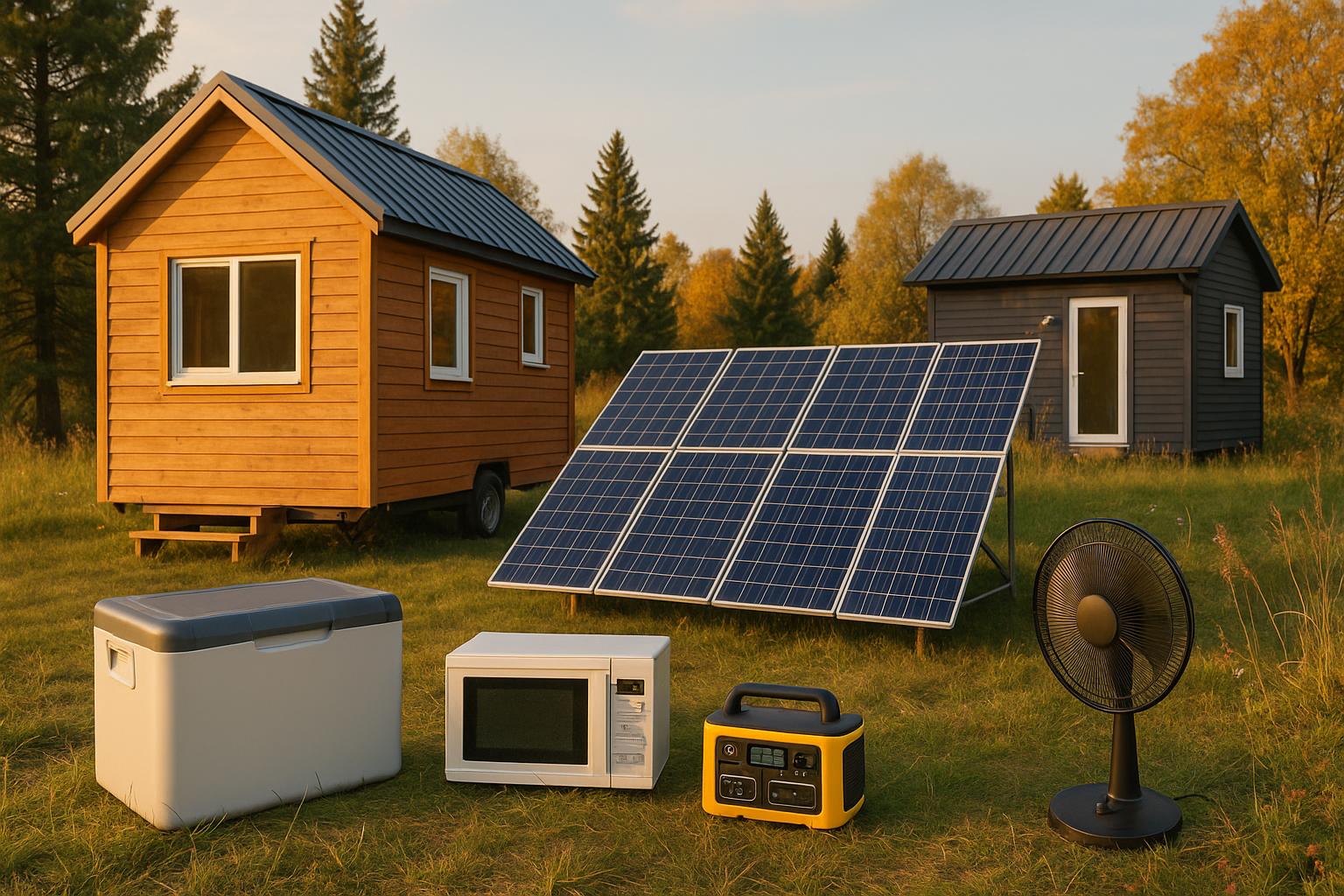
The Essential Guide to Solar Appliances for Off-Grid Tiny Homes and Canadian ADUs
Estimated reading time: 10 minutes
Key Takeaways
- Solar appliances enable reliable off-grid living in Canadian tiny homes and ADUs by reducing energy consumption.
- Effective design involves matching ultra-efficient devices with modest solar PV systems and battery storage.
- Compliance with the Canadian Electrical Code is essential.
- Energy management strategies and winter preparations are critical for sustained, resilient off-grid living.
- Additional sustainable solutions such as water harvesting, composting toilets, and high-performance insulation further enhance system efficiency.
Table of contents
- Introduction: Solar Appliances for Off-Grid Living and Canadian Tiny Homes
- Overview of Off-Grid Living in Canada: Relevance for Canadian ADUs
- The Role of Solar Appliances in Tiny Home Energy Systems
- Practical Tips for Choosing and Using Solar Appliances
- Solar Appliances Tailored for Canadian Tiny Homes and ADUs
- Sustainable Solutions Beyond Solar Appliances
- Conclusion: Achieving Off-Grid Living with Solar Appliances
- Frequently Asked Questions
Introduction: Solar Appliances for Off-Grid Living and Canadian Tiny Homes
Solar appliances are purpose-built devices designed to run on energy supplied by solar photovoltaic (PV) systems or direct solar thermal energy. These include solar refrigerators, solar water heaters, portable induction cooktops, and DC water pumps – ideal for settings where electricity is scarce or generated on-site.
Off-grid living means providing your own electricity, water, and waste management without relying on traditional utilities. For many Canadians, this involves tiny homes or ADUs engineered for energy efficiency and sustainability. With renewable energy solutions and smart appliance choices, off-grid living becomes a resilient answer even in harsh Canadian winters.
Learn more about sustainable off-grid lifestyles at Haliburton Solar and Wind and explore the benefits of tiny home living in this guide.
Overview of Off-Grid Living in Canada: Relevance for Canadian ADUs
What is Off-Grid Living?
Off-grid living is a lifestyle in which all utilities – electricity, water, and waste – are managed independently. Typical strategies include:
- Generating Electricity: Solar PV, wind, or micro-hydro systems supplemented by battery storage.
- Sourcing Water: Utilizing wells, rainwater harvesting, or local water bodies.
- Managing Waste: Deploying septic systems or composting toilets.
- Regulatory Compliance: Adhering to the Canadian zoning and building regulations.
More than 280 Canadian communities live without traditional grid systems, showing that off-grid living is both feasible and increasingly popular.
Benefits and Challenges
- Benefits: Energy independence, sustainability, resilience during storms, and potential long-term savings.
- Challenges: Harsh Canadian winters, diverse regulatory codes, and ensuring sufficient energy storage for low sunlight days.
For a comprehensive overview, check out articles like this guide.
The Role of Solar Appliances in Tiny Home Energy Systems
What Are Solar Appliances?
These appliances are engineered to minimize energy consumption and operate efficiently with solar systems. Key features include:
- Ultra-low watt consumption per task.
- Direct operation from DC sources (12V, 24V, or 48V) to reduce inverter losses.
- Optimized for the limited capacity typical in off-grid settings.
For further insights, visit Building an Eco-Friendly Home.
Types of Solar Appliances Suitable for Canadian Off-Grid Settings
- Refrigerators/Freezers: DC-powered or high-efficiency AC models.
- Water Heaters: Solar water heaters with thermal collectors or PV-powered heat pump water heaters.
- Cookers and Induction Cooktops: Designed for efficient cooking, especially during peak solar hours.
- DC Water Pumps and LED Lighting: Minimize energy drain while ensuring optimal performance.
Review more details on energy efficiency in tiny homes at this comprehensive guide.
Practical Tips for Choosing and Using Solar Appliances: Maximizing Off-Grid Living
Selection Factors
- Energy Consumption: Look for Energy Star labels and ultra-low standby loads.
- Appliance Sizing: Ensure appliances match your off-grid system’s capacity without overloading it.
- Electrical Compatibility: Verify voltage matches your battery system and conforms to CEC standards.
- Climate Suitability: Select devices that operate reliably in cold conditions and include freeze protection.
Installation & Maintenance
- Installation: Follow manufacturer guidelines, including overcurrent protection and proper ventilation.
- Maintenance: Regular cleaning of solar panels and inspection of wiring & firmware updates ensure optimal performance.
Energy Management Strategies
- Daily Energy Budget: Track your watt-hour usage and schedule high-draw tasks during peak sunlight.
- Load Management: Use smart plugs and timers to stagger appliance operation.
- Winter & Backup: Oversize battery storage and maintain a backup generator for prolonged low-sun periods.
Discover additional tips in Tiny Home Design in Canada.
Solar Appliances Tailored for Canadian Tiny Homes and ADUs
Example 1: Ontario Four-Season Tiny Home
- System Specs:
- 2.4–3.6 kW roof-mounted PV array
- 10–15 kWh LiFePO₄ battery bank
- 3–5 kW inverter/charger
- DC refrigerator (0.4–0.7 kWh/day)
- Heat pump water heater and induction cooktop optimized for midday use
- LED lighting and efficient water distribution with pressure pumps
- Backup systems: Propane heater and portable generator
Example 2: Atlantic Canada Cottage ADU
- System Specs:
- Solar thermal drainback collector for hot water (spring–fall)
- PV-powered heat pump water heater during shoulder seasons
- Soft-start well pump powered by PV system and batteries
- Efficient laundry setup with solar-timed operation
For thorough planning and permitting guidelines, visit Accessory Dwelling Units: The Ultimate Guide.
Climate and Site-Specific Recommendations
- Winter Performance: Tilt PV arrays to 45–60° and oversize battery storage.
- Freeze Protection: Use glycol-based systems or drainback technology, and insulate critical lines.
- Low Sunlight: Choose the most efficient models and plan high-demand tasks for solar peak hours.
Learn strategies for northern climates at Cold Climate Tiny Home Construction.
Sustainable Solutions Beyond Solar Appliances
Water, Waste, and Building Efficiency
- Rainwater Harvesting: Employ hard-roof collection, first-flush diverters, and multistage filters for clean water.
- Waste Management: Consider composting toilets and greywater systems for efficient resource reuse.
- Building Efficiency: Use high-performance insulation, air-sealing techniques, and triple-glazed windows to conserve energy.
- Efficient Heating: Utilize cold-climate heat pumps and backup stoves to maintain comfortable indoor conditions.
Additional reading on water management can be found at Rainwater Harvesting for Tiny Homes in Canada and on waste management at Composting Toilets for Tiny Homes.
Conclusion: Achieving Off-Grid Living with Solar Appliances in Canadian Tiny Homes and ADUs
Solar appliances are the cornerstone of efficient off-grid living, enabling energy independence and lowering monthly bills for Canadian tiny home and ADU owners. By carefully choosing devices that match your energy needs and adhering to updated CEC standards, you can create a resilient, sustainable living environment—even in harsh winters.
Remember to evaluate your daily energy budget, opt for ultra-efficient, climate-suitable appliances, and integrate broader sustainable solutions such as water harvesting and enhanced insulation. These thoughtful decisions pave the way for a secure and comfortable off-grid future.
Explore more insights on energy management at EcoFlow’s guide and learn about independent living in guides like this comprehensive resource.
Frequently Asked Questions
What makes solar appliances ideal for off-grid living?
Solar appliances are designed to use minimal energy and can operate directly from solar PV systems. This efficiency helps reduce the size and cost of solar arrays and batteries, crucial for off-grid settings.
How do I ensure my solar system meets Canadian regulations?
Always work with certified installers who follow the latest Canadian Electrical Code and local zoning regulations, ensuring your system complies with all safety standards.
Can off-grid systems support harsh Canadian winters?
Yes, with proper planning such as oversizing battery storage, selecting climate-suitable appliances, and including backup heating options, off-grid systems can reliably support winter conditions.
Where can I find more tips on energy management for tiny homes?
For additional strategies, review resources like Off-Grid Living in Canadian Tiny Homes and energy-efficient design guides available online.

Leave a Reply